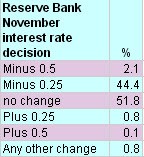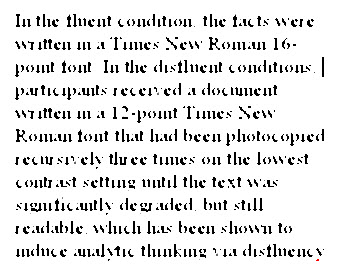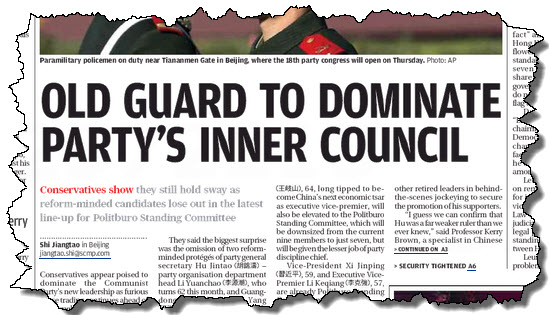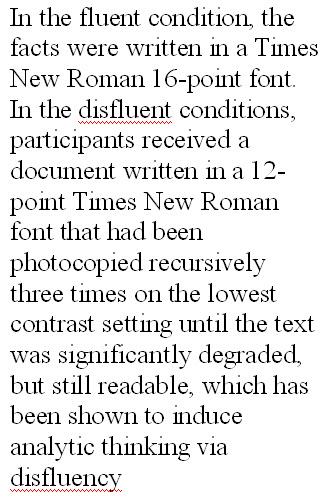Take your pick on interest rates. No real consensus among the market players as to what the Reserve Bank will do on interest rates tomorrow. The Crikey Indicator shows the probabilities as:

Election shock: late swing to conservatives. The influence of China’s old guard looks like living on in the other election this week that is sure to influence the whole world. Hong Kong’s South China Morning Post reports that conservatives appear poised to dominate the Communist Party’s new leadership as furious horse trading continues ahead of next week’s transfer of power in Beijing.
The latest consensus among outgoing leaders, their immediate successors and influential party elders is that the party’s innermost circle may still be subject to last-minute changes ahead of the 18th congress starting on Thursday, according to sources close to the inner workings of the once-a-decade generational transition.
However, the sources said that the Politburo Standing Committee’s likeliest line-up was now packed with conservatives including vice-premier and Chongqing party chief Zhang Dejiang, 65, propaganda chief Liu Yunshan, 65, Shanghai party boss Yu Zhengsheng, 67, and Tianjin party chief Zhang Gaoli, 65.
They said the biggest surprise was the omission of two reform-minded protégés of party general secretary Hu Jintao — party organisation department head Li Yuanchao, who turns 62 this month, and Guangdong party chief Wang Yang, 57 — mainly due to their relative youth and opposition from conservative party elders, including former premier Li Peng.
Make it harder to read. There’s no doubt that when it comes to political matters people selectively seek evidence that is consistent with their prior beliefs and expectations. Partisans see what they want to see. But researchers at the University of Illinois claim to have found a way to get liberals and conservatives who are polarised on certain politically charged subjects to become more moderate. Just get them to read political arguments in a difficult-to-read font.
“In one experiment participants were asked to read an overtly political argument about capital punishment. The liberals and conservatives who read the argument in an easy-to-read font like the one above were much more polarised on the subject than those who had to slog through the difficult version like the one below.”

“In a separate experiment, people were shown documents that praised or criticised the behaviour of a defendant in a mock trial before they saw the (rather sketchy) evidence against him. As expected, those who read an unflattering account of the defendant’s character were much more likely to convict him than those who read a more complimentary report. The two sides were far apart on their assessment of the evidence.”
The results were interesting: “… when people read a difficult-to-read summary of the evidence, then they became more moderate,” said researcher Ivan Hernandez. “Those with the positive impression suddenly thought maybe he could be guilty and gave more guilty verdicts than those who had read the evidence in a normal font. And the people who didn’t like him started giving more not guilty verdicts relative to before.”
The propensity of politicians to sue. A glance at a dictionary would show you that a Sydney Morning Herald story used an inappropriate word to describe Martin Ferguson’s role in renegotiating the mining tax after the sacking of Kevin Rudd. Take the word used literally and you would think that the resources minister had arranged things with mining companies for his own personal financial advantage. It is the kind of word that as a journalist conscious of the need not to needlessly defame people you would hope to avoid even if it was used by the person whose views you were reporting.
Having done far worse things during 50+ years in journalism, far be it from me to cast a stone especially as the context of the article makes it clear, to me anyway, that Rob Oakeshott did not think that the offending word had its dictionary meaning. How much better it would have been if he had responded to the letter from Martin Feguson’s law firm’s letter by admitting his error rather than complaining about legal intimidation.
And how much better still if the minister had picked up the phone and rung the independent MP before deciding on a duel by lawyers at 20 paces.
The only winner in this sorry little story is Prime Minister Julia Gillard who intervened to stop the mountain being made over the verbal molehill.
News and views noted along the way.










So blurring the facts DOES help